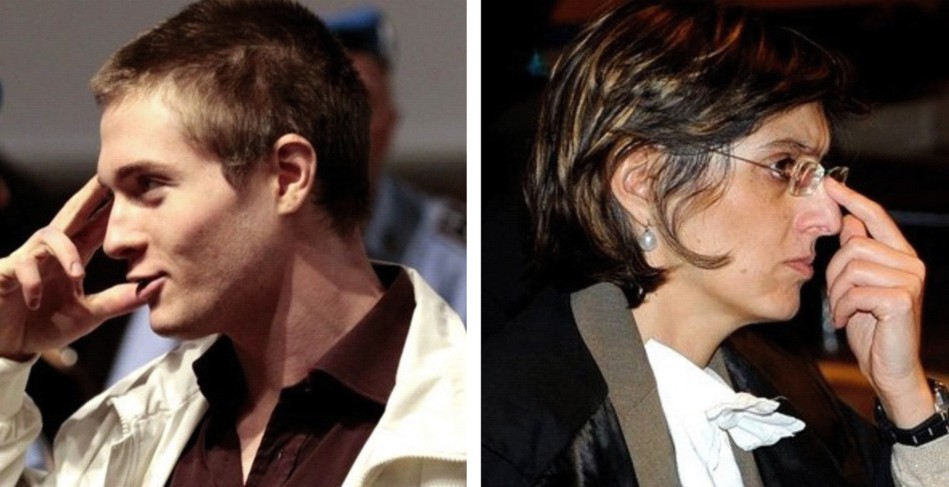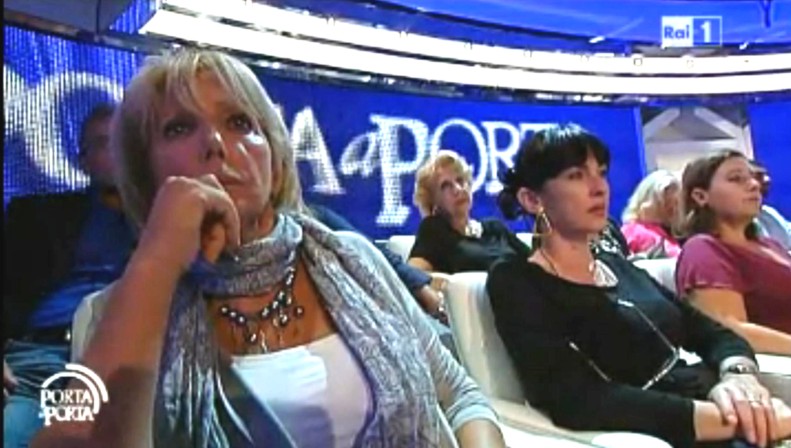
Headsup: To those many lawyers amazed that Knox did not get on the witness stand to head off a certain re-conviction: the best guess among Italian lawyers is that Knox's own lawyers feared ANOTHER calunnia charge if she repeated the crackpot and highly disprovable claims that she was tortured. The tough calunnia law is primarily a pushback measure against mafia meddling which is widely suspected in this case.
Saturday, October 20, 2012
Exploding Nightmare For Lawyers Of The Defense: Torrent of “Mistakes” In Sollecito’s Hapless Book
Posted by Sara
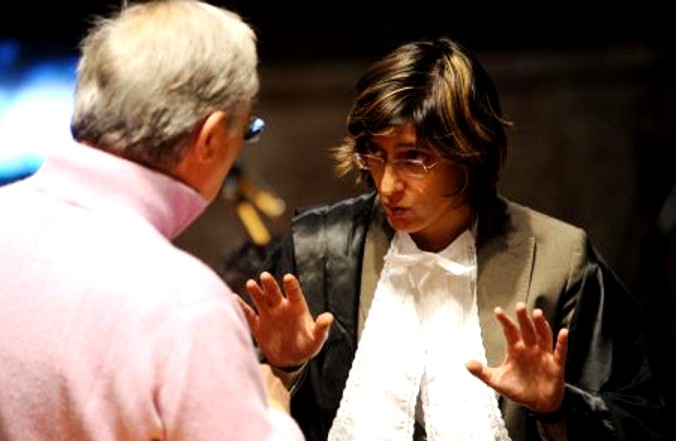
More and more and more wrong facts and libels are being turned up in Sollecito’s pathetic book, both by us here and by an irritated officialdom in Rome and Perugia.
Amanda Knox is rumored to perhaps be mentally unstable and figuratively locked in the attic in Seattle. Now Sollecito seems to have been disappeared back in Italy for his own good as well.
Sollecito’s own lawyers (who have in the past threatened to walk) and his own family have already thrown him to the wolves on Italian TV over just one highly libelous claim and there are an estimated two dozen more still to surface.
Not really a good idea to write a shrill “I’m the real victim here” book unchaperoned, when you have the smug mentality of a 12-year-old. The facts strongly against you. A very bright prosecutor. And a ghost writer whose slobbering over a laughably fictional Sollecito suggests he has a something of a boy-crush.
Raffaele Sollecito has made many stupid claims in his book, but perhaps none is so obvious and more idiotic than his claims about the “lost” emails.
What is it with this guy and the emails? He seems to think (or perhaps, thinks that the readers are stupid enough to believe) that if a computer or a hard drive is destroyed, all the emails in it are lost as well. Come on already, surely they taught him the mechanisms of email in his computer classes.
Look at his statements regarding emails. In chapter 2 (Love and Death) of his book, he describes the morning after the murder -
I’d been up several times in the night””listening to music, answering e-mail, making love””and wanted only to go back to sleep
Right, so he got up many times in the night to answer e-mails. You’d think that this would be his biggest alibi for the night of the murder, right? No, wrong. Raffaele could not prove his alibi because, in his own words -
I did not yet know that the Polizia Postale””supposedly experts in handling technology issues””had seized two of my computers along with Amanda’s and Meredith’s and somehow wrecked three of the four hard disks while trying to decipher them. The bottom line was that the damaged disks were now deemed unreadable. That left just my MacBook Pro to provide an alibi for the night of the murder.
But modern emails DON"T EVEN RESIDE on local hard drives unless one DELIBERATELY downloads them. And even if one does (and hardly anyone ever does) there rarely is reason to completely delete the original, and here there seems about zero reason to do that.
And even if the original IS deleted Facebook and email services have shown under legal pressure that they maintain complete backups going back many months. No way Sollecito’s supposed emails on the night could have been made to simply no longer exist.
Again, when he talks about Amanda and Meredith’s friendship, he says -
If either Meredith’s or Amanda’s computer had survived the police examination, there might have been photographs, emails, and other evidence to point to a more meaningful interaction
Here we go with the elusive emails again. Will someone explain the point of email to this guy? What difference would the local computers surviving or not surviving make to any emails residing on his host’s servers?
He actually has the nerve to criticize the Polizia Postale’s technical competence after making a statement to the effect that he and Amanda could not retrieve their emails as the hard disks were damaged.
Whether the hard disks were destroyed or not, whether it was the Polizia Postale’s fault or not is hardly important here. Admittedly, Amanda is not a “technical genius” (After all, she does not know how to delete messages from her sent items).
But what is stopping this resident technical genius from simply accessing his email box from some other computer or iphone, and printing out a copy from his sent items? Why doesn’t he ask even one of the happy recipients of his emails - by the way, who were they? - to forward it back to him?
Did all of them delete his mails from their in boxes and trash too? Even if we defy all logic and accept that they did, what’s stopping at least one of them from coming forward and testifying that they received a mail from him that night? Did all of them get selective amnesia at the same time too?
Similarly, if any emails that proved the “close friendship” between Amanda and Meredith existed wouldn’t they still be retrievable from Amanda’s mailbox? She could have printed a copy any time. Did she go around deleting all of Meredith’s mails the minute they arrived as well as her own replies to them, and clearing her trash box and all her host’s backups as well, just to be doubly sure they can’t be retrieved?.
Ok, let’s say the emails were deleted. What about the photographs? If there had been any photographs that would establish their “close” friendship, wouldn’t they be there on the camera or phone from which they were taken? Or wouldn’t either Meredith or Amanda have sent them to someone or posted them on their Facebook?
How did EVERYTHING vanish without a trace? If neither of them ever sent the photos to anyone or posted them online anywhere, or even kept them on file, you really have to wonder what was the point of taking them at all.
No one is claiming that Amanda and Meredith were at loggerheads all the time, they might even have gotten along initially. Meredith was not a person who judged people harshly. By all accounts, she did try her best to get along with Amanda, trying to include her in outings and defending her when she got into trouble.
It was Amanda who pulled away saying she wanted to socialize only with Italians. But the fact is that there were clashes and there were differences between them. Trying to make out that they were the best of friends by claiming the destruction of non-existent proofs is not only unbelievable but also utterly stupid.
Like our main poster Hopeful summarized it: this claimed computer genius has never in four years been able to prove he sent an email? Ridiculous.
Thursday, October 18, 2012
The Sunk Ship: This Week’s Closed Hearings Required The Conversion Of This Theater
Posted by Peter Quennell

The international media presence at the hearings in Grosetto matches those at the end of the trial and the appeal in Perugia.
But despite the conversion into a court of the large Theater Moderno shown here, the media is not getting to observe the hearings first-hand. The judges decided that they all have to wait outside.
So many passengers and relatives of victims wanted to attend to look Captain Schettino in the eye that they occupy all of the several thousand seats.
This hearing is similar to the hearing presided over by Judge Micheli in October 2008 to decide whether to remand Knox and Sollecito for trial. We should know in a few days if Captain Schettino and several other officers and company officials will face trial for manslaughter and other crimes.
Perhaps the most shocking fact to emerge from the reports prepared for the hearings is that once the ship was gashed in the side it was almost instantly mechanically incapacitated. If a brisk headwind had not stopped the ship and pushed it around onto an underwater shelf, it might have sunk in minutes, perhaps with several thousand drowned.
The captain has just been fired. He in turn is strenuously trying to shift the blame for the disaster to his fellow crew, many of whom had weak English and no Italian, and also to the cruise company.
The cruise-line business has now recovered but, as with the Titanic, a lot is being learned around the world about ship construction, emergency ship management, and the relevant law.


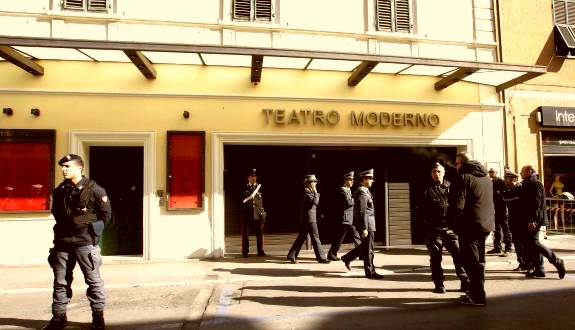

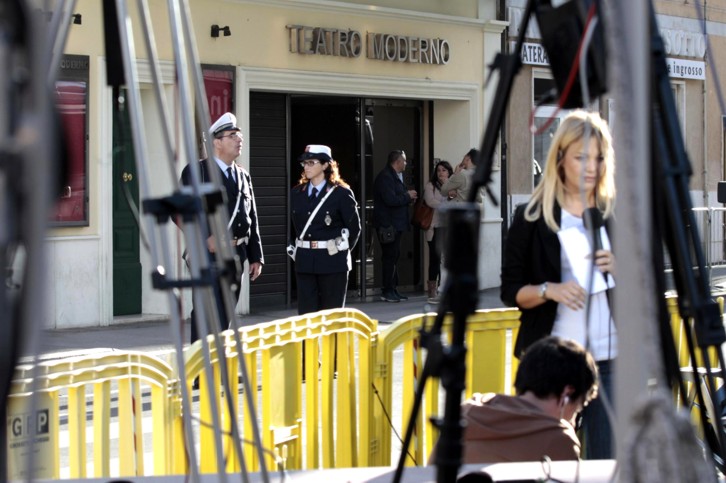
[Below: Captain Schettino, now fired by his company, arrives from Sorrento for the hearing]
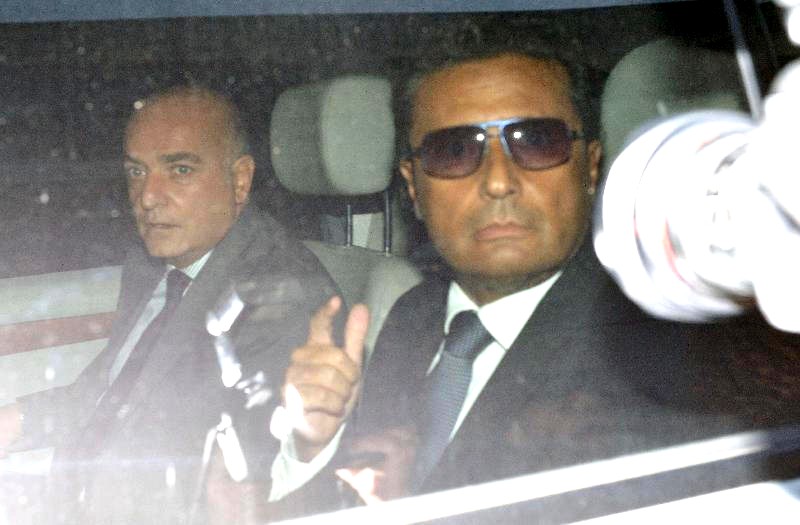
[Below: Giulia Bongiorno reopresents some passenger and seeks a class action suit]
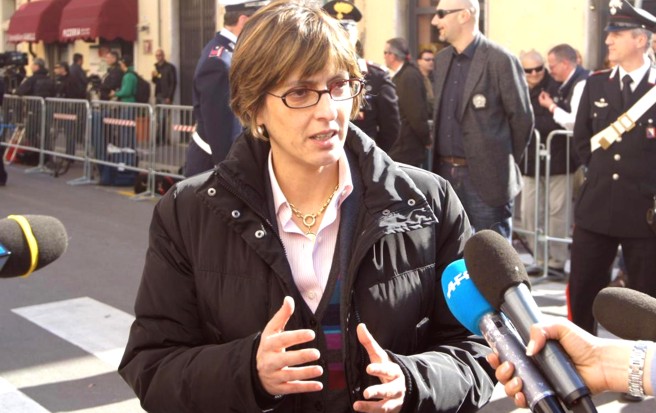
[Below: the ship now shows up on Google Earth. The rocks it hit are at lower left]
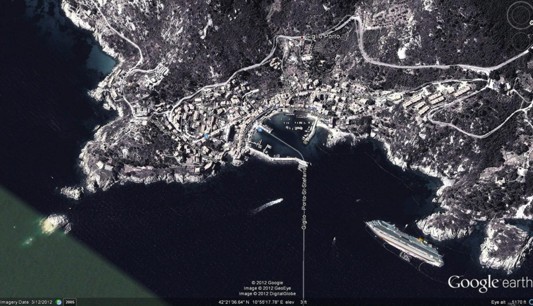
Monday, October 15, 2012
Professor Snape Saves 99.9999% Of Seattle From A Pestilent Raffaele Sollecito
Posted by Professor Snape

It has been awhile since I last reported on the perceptions of average Seattleites regarding the ongoing Meredith Kercher murder trial saga.
The recent arrival of Raffaele Sollecito in Seattle on the final stop of his book promotion tour provided an excellent opportunity to revisit this interesting and telling topic.
By the time Raffaele had arrived in Seattle it was well known that his book sales would ultimately be dismal, and that his father was overly busy in the Italian media strenuously disavowing the major claim of the book; the claim of illegal backroom corruption that is central to the book’s “Honor Bound” title.
And where Sollecito wasn’t lying outright, it had become painfully obvious that many of the new claims in his book directly contradicted statements he had previously made in his prison diary, or that can readily be found in other early sources of case information.

With this in mind, under protection of his invisibility cloak Professor Snape casually strolled into a cold and nearly empty auditorium on the University of Washington campus to find out firsthand exactly who would be attending such an event.
He found himself among no more than 60 aging and grayish FOA groupie types, most with Raffaele’s book tucked carefully underarm in high anticipation of a dynamic evening, as if a prized show horse were about to enter an arena.
It seemed that in spite of extensive national and local promotion the good people of Seattle had stayed away entirely! In fact, Snape observed one woman who showed up at the door in response to a local radio ad, but then walked away in disgust upon learning that she would have to pay a $5 entry fee if Raffaele’s book were not purchased onsite.
So as it turned out, this was going to be an evening for friends and family only, with absolutely no groundswell of grass roots support from Seattleites, or even Amanda Knox herself for that matter, who sent her mother and sister instead to honor the imagined savior, Raffaele Sollecito.

As a welcoming gift, Snape threw down the Permanent Sticking Charm causing an uncomfortable delay to the program. Event organizers began complaining of a Jinx in the audio or video equipment and one loudmouth attendee sarcastically suggested that the press photographer might be able to do a better repair job than the UW AV staff. This was followed by chuckles and chest pounding causing Snape to consider invoking the Reparo Charm, but instead he provided only his trademark sly sneer.
The show finally started. Everyone seemed to have their books out in hand, except for Snape who could be singled out because he was one of the few who possessed a half torn gold admission ticket. The audience eagerly awaited juicy and triumphant tales from the currently ex-con Sollecito, as if his narrative would be somehow bold and charged with ownership. However, things quickly stagnated into pathetic mumbling and unbelievably boring descriptions of irrelevant events.
One could easily assume that Raffaele was under the influence of a Babbling Curse, but he didn’t require any of Snape’s help whatsoever.

News anchor Dennis Bounds from Seattle’s KING 5 TV succeeded spectacularly in bringing the interview to an even lower than anticipated standard. Bounds declared at the outset that the two had spent a great deal of time the day before preparing for this supposedly spontaneous interview. At the beginning of the interview it seemed as though the audience was ready to reach out and pet Raffaele’s adorable made-over hair as if he were a poodle on a podium.
But all too soon his ho-hum responses caused even this adoring crowd’s anticipation to plummet like facebook stock values.
Bounds tried very hard to extract meaningful replies from Raffaele, but Raffaele remained unfocused and glazed over as if on some kind of stardom high; stupidly cheerful and starstruck. Bounds provided Raffaele with obviously rehearsed and leading questions from his cue-sheet, along with tips and reminders for answers when Raffaele stumbled or hesitated. At times Bounds even had to resort to guessing what Sollecito might have felt, when there was no ready response.

At times during the program a larger than life photograph of Meredith Kercher mysteriously appeared on the large screen above Bounds and Sollecito. This happened on three separate occasions, which became odder still because Bounds and Sollecito just kept right on talking, never once pausing to address or acknowledge Meredith’s presence.
Furthermore, you could hear a pin drop when this happened and the entire audience seemed to be frozen in a shock state.
A few heads looked pensively towards the event organizer; a woman in a red dress who ran swiftly up to the projection booth to erase the image. Heads turned again when Meredith’s picture came up a second time, while the UW AV crew in the back chuckled and snickered. After Meredith’s 3rd appearance before the crowd an ominous “power off” signal appeared on the screen and Meredith was gone; all the more strange because none of this seemed to have anything to do with the ongoing and terribly bland program.
Sollecito continued regurgitating shallow prefabricated answers, apparently borrowed from previous book signing engagements. His voice was in no way authoritative, but instead came across as low and unsure. At times he did not seem to recall the responses that he had been coached to provide. And then Bounds finally got around to asking Raffaele what he thought about Prosecutor Mignini and the home team audience roared with laughter, for the first and only time, as if they knew they were going to finally get what they came to hear.

Mignini could have been a topic that would get fur flying and put Sollecito into a much more animated mood. But no sparks flew. There were no gasps into the microphone, no fingers pointed or arms flinging in the air, and in the end nothing but a “Riddikulus” and mundane reply from Raffaele, “I do not know what Mignini thinks of me because Mignini never talked to me.” Bounds seemed taken aback and asked again about Mignini, but Sollecito was completely unable to offer any unkind words, which must have been a devastating letdown for this particular audience.
Bounds pressed Sollecito about the possibility his of coming to Seattle to live, work, and possibly attend the UW, but Raffaele seemed ambivalent while agreeing that it could be a possibility. Before wrapping up the interview Sollecito answered selected questions taken from index cards passed around the audience.
While this only served to extend the bore-fest, Professor Snape successfully inquired if Sollecito felt his book might have an impact on the upcoming prosecutor’s appeal to the Court of Cassation in Italy and if so, how. Sollecito seemed unable to provide his own coherent response and instead relied upon Bounds and the audience to first suggest, “yes, hopefully in a positive manner.”
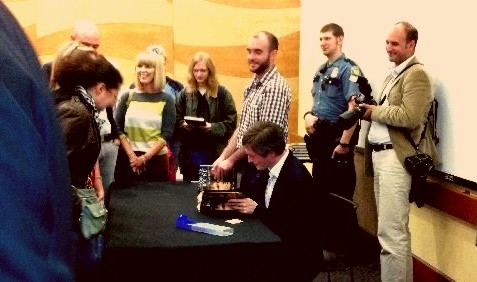
With that, Snape prepared to wrap up his investigative mission (with no book under cape) as three women approached, one after the other, insisting that Snape identity himself and the nature of his business at the event. When asked for his name by a crazy lady Number One, Snape defiantly asked back, “What is your name”, to which Number One replied, “I am a nobody”; truthfully spoken, as Snape’s Veritaserum cologne worked its magic.
Crazy lady Number Two demanded to know why Snape was taking pictures and Snape replied that it was because he found the event interesting. Number two pressed on, asking “Why do you think it is interesting?” Perhaps Number Two missed noticing that this was, in fact, a highly promoted book-selling tour and not a FOA backyard BBQ, or that the Barbara Walters top 10 most interesting people of 2011 included a subject mentioned conspicuously in the title of Raffaele’s book.
Unfortunately Number Two felt the need to make a hasty retreat, apparently under the influence of the Banishing Charm, before attempting to answer any questions from Snape.

Crazy lady Number Three was only slightly more civil and carried on in a polite but entirely too nosey manner, boldly asking who Snape was. “Oh, I have never heard that name before!” Number Three exclaimed under the influence of the Confundus Charm. Number Three herself had been taking countless pictures of everyone present all evening, explaining that she was a journalist for a small Seattle-area town. Honestly, though, she seemed much more like a bored hairdresser/plastic jewelry artist who might blog for an imaginary audience while waiting for imaginary customers.
As Snape departed he was nearly overrun by a couple of Seattle beat cops who were busy dragging out one of the attendees; a poor chap who lost his glasses and all hope of redemption during a defiant struggle. Following this one bit of excitement in an otherwise pointless evening, a flick of the levitation wand swiftly carried Snape away into the dark Seattle sky.
Friday, October 05, 2012
Foolish Claims In Book By Raffaele Sollecito: His False Timeline Conflicts With Other Evidence
Posted by willsavive

[Above and below: The front door of Sollecito’s apartment building on upper Via Garibaldi]
Raffaele Sollecito finally speaks out about the murder of Meredith Kercher and his involvement in the desperate hope that somehow he can gain an advantage.
With all of the highly questionable recollections from Sollecito in this book, and there are many, it seems practical decision to analyze one thread of the book, and compare Sollecito’s new version of events to the plethora of information available.
In this post we look at Sollecito’s story/perspective in regard to the night of the murder. Sollecito’s story sounds somewhat plausibly up until the night of 1 November 2007 (night of the murder).
Knox had stayed over at Sollecito’s flat the night before. She woke up around 10am and arrived home at around 11am. Sollecito arrived at Knox’s apartment at 2pm for lunch. Meredith, Amanda Knox, and Sollecito were the only three in the house at the time.
Meredith left the apartment around 4pm and Sollecito and Knox say they smoked a joint soon after, and then they left the cottage at Via della Pergola at around 5pm and wandered into town for some shopping.
Later that evening they arrived back at Sollecito’s flat.
Soon after, Sollecito’s Serbian friend, Jovana Popovic, rang the doorbell and asked if he’d mind driving her to the bus station at midnight to pick up a suitcase that her mother was sending. Sollecito agreed.
Popovic testified that this was around 5:30-5:45p.m. She testified that she had to leave at that time because she had a meeting at 6pm.
Jovana left, and then Sollecito and Knox began watching the movie Amélie. Sure, everything sounds good up to that point, but here is where Sollecito’s story of fantasy begins.
Sollecito next states that they had to keep pausing the movie as there were several interruptions. First, he states that “Amanda got a text from Patrick (her boss) telling her it was a slow night because of the holiday and he didn’t need her to come into work after all.”
Phone records show that this text was as late as 8:19pm, and Knox replied to Patrick via text at 8:35pm.
Sollecito writes that he received a phone call on his cell from his father at 8:40pm. This is corroborated by phone records and his father Francisco Sollecito’s testimony.
Sollecito then writes that Knox turned off her phone at 8:35pm and he turned off his phone after the call from his father, at 8:42pm, which is corroborated by phone records. He claims they next discussed what to make for dinner.
Sollecito then claims that after the movie ended he went into the kitchen to do dishes. It was at THIS time he claims the pipe under the sink began to leak.
Then he writes”¦”“Don’t you have a mop?” Amanda asked. I did not. She offered to pick one up from Via della Pergola the next morning and bring it round.” After that he claims that they cooked a fish dinner. Then he washed the dishes a second.
However Amanda Knox testified that they ate dinner later at around 10-11pm and THEN just the once he did dishes, at which much later time the pipe began to leak for the first time (Massei, pg. 69). Again, Amanda has made it clear, by stating several times during her testimony, that they “ate dinner, AND THEN, while Raffaele was washing the dishes, from the sink, a leak was noticed: water was leaking below and he looked at it; he turned off the water and then looked below the sink, and this pipe had become loose, so the water that was coming from the faucet was leaking out” (Massei, pg. 69).
However Sollecito’s own father, in contradiction, testified that during the 8:40pm call Raffaele had told him that “while he was washing the dishes he had noticed water leak under the sink that had spilled onto the floor,” and he had specified that he was with Amanda (Massei Report, pg. 63).
This is highly significant because, one can firmly theorize, that dinner and doing dishes occurred BEFORE 8:40pm.
So by telling this obviously fictional tale of eating dinner and doing dishes later, at around 10-11pm, retroactively more of an alibi is attempted for the couple, as the murder is estimated to have taken place at around or shortly after that time.
By placing the dinner later in the night, the couple would have shattered the theory of the Prosecution. But Sollecito’s own father stopped this dodge.

Thursday, October 04, 2012
Foolish Claims In Book By Raffaele Sollecito: The Courts Are The Most Reviled Institution In Italy
Posted by Machiavelli

It seems that the writers or publishers did not run Sollecito’s verror-prone and defamatory book past any lawyer in Italy.
His own lawyers Maori and Bongiorno seem to have been blindsided. The book-agent, shadow-writer and poublisher clearly did not even run it past any well-infomed and mature person at all in Italy (his own father included).
Francesco Sollecito says the book was not accepted for publishing in Italy because there was no demand. Perhaps the real truth is “the book was not even offered for publishing because any publisher or reader would have instantly nailed Sollecito’s lies”?
Lying 1/3 of a world away in English to an ill-informed and gullible American public is a lot easier to get away with than lying in Italian in his own back yard.
In the Preface to his book Sollecito has a passage defaming the Italian Justice System and includes this bizarre claim. “The courts “” tainted by politics, clubbishness, pomposity, and excruciating delays “” are the most reviled institution in the country.”
In actual fact the Italian justice system is remarkably NOT tainted by politics, as even the most surperficial watcher of the trials of ex Prime Minister Sylvio Berlusconi would know.
And on the issue of popularity we have previously posted this and this and also this.
Here are the collected compelling statistics on how the Italian citizenry actually perceives their justice system
For comparison, in 2011 the percentage of Italians who declared they trust the justice system “a lot” or “enough” was 53.3%. By comparison, the percentage of Italians who declared they trust the government “a lot” or “enough” were 14.7%, and those who trust the parliament were only 15%.
In 2012, the percentage of Italians who trust the parliament is now only 9.5%, and those who trust the Mario Monti administration are only 21.1%.
Over the eight years from 2004 to 2012 the percentage of Italians who trust the justice system was always bigger than those who trust parliament or government by at least ten points, and in some years we can see a spread of 20, 30, even 39 percentage points achieved by the judiciary over the parliament and government.
However, some cases of corruption (such as our Hellmann-Zanetti case, but also several others indicated by the Rapporto Italia 2012) do hamper trust.
The most trusted institutions in Italy above all are the Carabinieri (74% of Italians trust them) and the Polizia di Stato (71%).
Which means the most trusted institutions are precisely those law enforcement instruments which are deployed to enforce the orders of prosecutors.
(My source is “Rapporto Italia 2012” by EURISPES).
Tuesday, October 02, 2012
Stupid Claims Made By Raffaele Sollecito #3: His False Timeline Conflicts With Other Evidence #2 DRAFT
Posted by willsavive
Establishing an Alibi (Part II)
The next morning 2 November 2007, Raffaele’s father called his landline phone at approximately 9:30am. Raffaele claims that he was “too groggy” to answer the call, after being “up several times in the night””listening to music, answering e-mail and making love.”
Knox testified that she slept through the night and awoke at 10-10:30am.
After leaving Sollecito’s place, returning home and seeing all the strange things she described (door ajar, blood droplets in bathroom, blood on the bathmat, and feces in toilet), Knox casually takes a shower and returns to Sollecito’s apartment, or so she says.
They eat breakfast and she tells Raffaele about the somewhat strange circumstances at the cottage. Raffaele then instructs her, as he writes, to call one of her roommates to discuss the situation.
Now, get ready for a head-scratcher!
In his new book, Raffaele writes that Amanda made the call to her roommate, Filomena, on the walk down to Knox’s place.
However, in his prison diary and in a letter to his father from prison, Raffaele writes that the first call to Filomena was while they were at the cottage, after Knox allegedly went around the back of the house to try to gain visual access into Meredith’s room.
But Knox testified that she made this call from Sollecito’s flat. She also wrote in her 4 November 2007 email to family and friends that the first call to Filomena was made from Sollecito’s flat. Phone records put this call at 12:08pm, coming off of sector 3, which covers Sollecito’s flat.
Both Knox and Sollecito have always maintained that they were together during this phone call.
Meanwhile, Filomena testified that during that conversation, Knox told her that she was at the cottage alone and that Knox said she was going to phone Raffaele after they hung up.
Ok, confused yet? Good liars can do that to you.
Here is how it breaks down! This is an excerpt from my book STUDY ABROAD MURDER explaining Knox’s motive for intentionally flubbing the times.
Why did Knox tell Filomena that she was at the cottage, but tell the court that she was at Sollecito’s flat during that call? The answer is simple, because the postal police arrived unexpectedly, which made Knox have to change her story.
Knox couldn’t have been at the cottage at 12:08pm, return to Sollecito’s, do all that she claimed to have done there, and then return to the cottage in time for the postal police to arrive (at 12:25pm). She had to change her story to fit her new timeline.
Raffaele has tailored his story of the call around the court-constructed time-line of events and Knox’s own version. What follows is where Sollecito’s story becomes extremely unbelievable and factually ridiculous.
It is as if he needs to do research on his own story to make it fit into what actually happened. These are not just mere mistakes, but blatant tweaks, contradicting all scientific logic, to show the guilty as innocent. Raffaele is not concerned with phone records or witness testimony; he won’t let the truth get in the way of his version.
Sollecito then claims that, while they were checking out the house, Filomena calls back, and tells Knox that Meredith is the only one unaccounted for. According to Sollecito’s timeline in his book, after the call this happens.
Then I pushed open Filomena’s door, which had been left slightly ajar, and saw that the place was trashed. Clothes and belongings were strewn everywhere. The window had a large, roundish hole, and broken glass was spread all over the floor.
So, he is actually trying to say that this was the first time that he and Knox noticed Filomena’s room in disarray?!
Let’s do some fact checking here. After their first discussion, Filomena called Knox back at 12:12pm and 12:20pm, both times she received no answer. Filomena called Knox one last time, at 12:34pm, this time Knox answered and told her to rush home.
The postal police had already arrived at the cottage and had already been greeted by the unsuspecting Knox and Sollecito.
The purpose for Knox’s original call to Filomena was to have her rush over to the cottage so that they could walk in together and discover the body. This is evidently why Knox didn’t answer either of these two calls from her. Knox wanted Filomena to discover the broken window, the locked door, etc.
However, now frantic, because police had arrived before Filomena, and in an effort to get Filomena into a frenzy and rush home, Knox tells her that her window had been broken and her room ransacked. “Come home immediately!” Knox commands.
Filomena tells Knox to call the police, and says she is on her way. Knox doesn’t make any mention that the postal police had ALREADY arrived. This is the second and last time that she speaks to Filomena until Filomena arrives at the cottage, just before 1pm.
After making a “halfhearted attempt to kick in Meredith’s door (not sure it was the right thing to do) then peering through the keyhole and seeing Meredith’s brown leather purse sitting on the unmade bed;” Sollecito then claims that Knox went across to the “terrace at the back of the house and see if we can’t reach her window,” to no avail.
In his other versions, this is where Sollecito claimed that Knox called Filomena from.
In the book, however, Sollecito claims that he proceeded to call his sister, Vanessa, at this time. Sollecito claims that he called the carabinieri after the phone call to his sister. Only minutes after the call to his sister, Sollecito claims that the postal police arrived.
But phone records show that Sollecito didn’t call his sister until 12:50pm, and then he called the emergency number (211 in Italy, comparable to 911 in the U.S.) at 12:54pm to report a burglary. This was well AFTER the postal police had arrived. Thereafter Paola and Filomena arrived at the cottage, just before 1:00p.m..
Postal police had radioed back to HQ at 12:35pm., informing them that they had arrived at the cottage.
They toured the cottage with Knox and Sollecito, looking for signs of a burglary. After Knox and Sollecito had slipped away behind Knox’s closed door to make several phone calls (including Sollecito’s calls to his sister and the carabinieri, and Knox’s call to her mother), Marco and Luca were briefed by the Postal Police and also toured the cottage briefly.
They had arrived about fifteen minutes or so before Filomena and Paola had arrived (at approx. 12:47p.m.). When Marco and Luca arrive, the postal police were already there.
Finally, the Postal Police radioed back to HQ at 1pm, informing HQ that Filomena had just arrived, as she was the reason that they were there (because the phone found was registered to her name).
Paola testified that Knox and Sollecito were coming out of Amanda’s room when she arrived at the cottage. This is clearly just after they made their phone calls, including the one to the carabinieri.
This is just a short analysis, but it reflects the myriad of inconsistencies with Sollecito’s claims. He not only contradicts the versions of others, but often times he contradicts his own versions of events.
Even though this review covers a brief period of time, it certainly reflects the most important time period for Knox and Sollecito, and may come back to haunt the couple in March 2013.
Monday, October 01, 2012
Testified That This CCTV Camera Probably Last Photographed Meredith Alive DRAFT
Posted by Peter Quennell
Put back at March 13 2009

Nick Pisa reporting from the trial on Sky News:
The Meredith Kercher murder trial has been shown CCTV footage of what the prosecution said was her arriving at home just hours before she died.
The grainy footage was taken from a car park camera overlooking the house where the British exchange student was found dead.
Other people were also in the images but police were not able to identify them, the Italian court heard. The jury was also shown CCTV images of officers arriving at the house after the murder.
It seems to have been similar to the CCTV footage in this video we posted where the camera is down at the intemediate level of the parking building.
This video will have been compressed for broadcast and the internet. The judges and jury would have been shown better-quality video directly from the camera.
Shots below show the entrance ramp to the upper level of the parking facility - the gate of the house is directly opposite - and the two CCTV cameras up there that record all arriving cars.
Meredith seems to have approached her house for the last time down the steps by the square in front of the School for Foreigners. Shown in the second-to-last shot below.
The bottom of the steps is a short distance behind our own camera in the three shots directly below.
Below: If you expand the image you can see the two CCTV cameras in this shot. It is the left camera that faces the gate of the house, and the famous intersection and dumpsters.
The trees in the background are in the park between the steps on this side of it (those that Meredith probably came down) and the School for Foreigners on the other side of it.
Below: Meredith seems to have approached her house for the last time down these steps by the square which is in front of the School for Foreigners about 100 meters off to the right.
Below: Meredith would have been about where the white car at back is to be caught on the CCTV camera maybe 20 meters to the right. The gate of her house is just beyond the car, and the steps down are off at hard right here and up behind.
Sunday, September 30, 2012
Correcting Sollecito: A Task In Which We’d Like To Invite Everybody Here To Help DRAFT
Posted by Our Main Posters
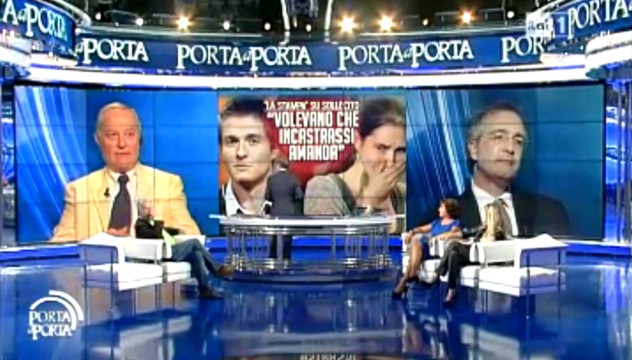
[Image above: Francesco Sollecito, left, trying to defend his loose-canon son on Italian national TV]
What was Sollecito thinking? If he was indeed thinking?
To our Italian lawyers his highly aggressive and inaccurate book seems a really misconceived attempt at an extra-legal end-run, by someone with low credibility and an over-sized ego who still stands accused of murdering Meredith.
Especially in face of an increasingly widespread grasp beyond Italy of the real facts - and of a remarkable Italian Supreme Court appeal by the prosecution which looks to be almost impossible to beat.
Main sources for the “research” by the shadow writer Andrew Gumbel seem to be Nina Burleigh and Candace Dempsey, two PR shills for the Knox family with notorious chips on their shoulders toward Italy. Andrew Gumbel seems to have anti-Italy and competency issues of his own.
None of the three are lawyers. In fact no good lawyers are publicly standing up for the two accused and repeating any of the junk law or false facts or defamatory claims in the book.
Simon & Schuster don’t seem to have insisted on any fact-checking or checking against Italian law. New charges against Sollecito have already been threatened in Italy based on the couple of pages made famous by the Porta a Porta TV program, during which Sollecito’s own father had to distance himself sharply from his son’s claims.
Italian authorities and media read here. We’d like to help them further by identifying just which “facts” are wrong in the book (in places Sollecito even contradicts his own past words) and who is unfairly depicted, which seems to be just about everybody.
Our new book corrections page is here. It can also be reached via the new link in the left column. All help is most welcome.
Thursday, September 27, 2012
Translation Of Dr Mignini’s Interview After Takedown Of Sollecito Book On Porta a Porta
Posted by Ziak.
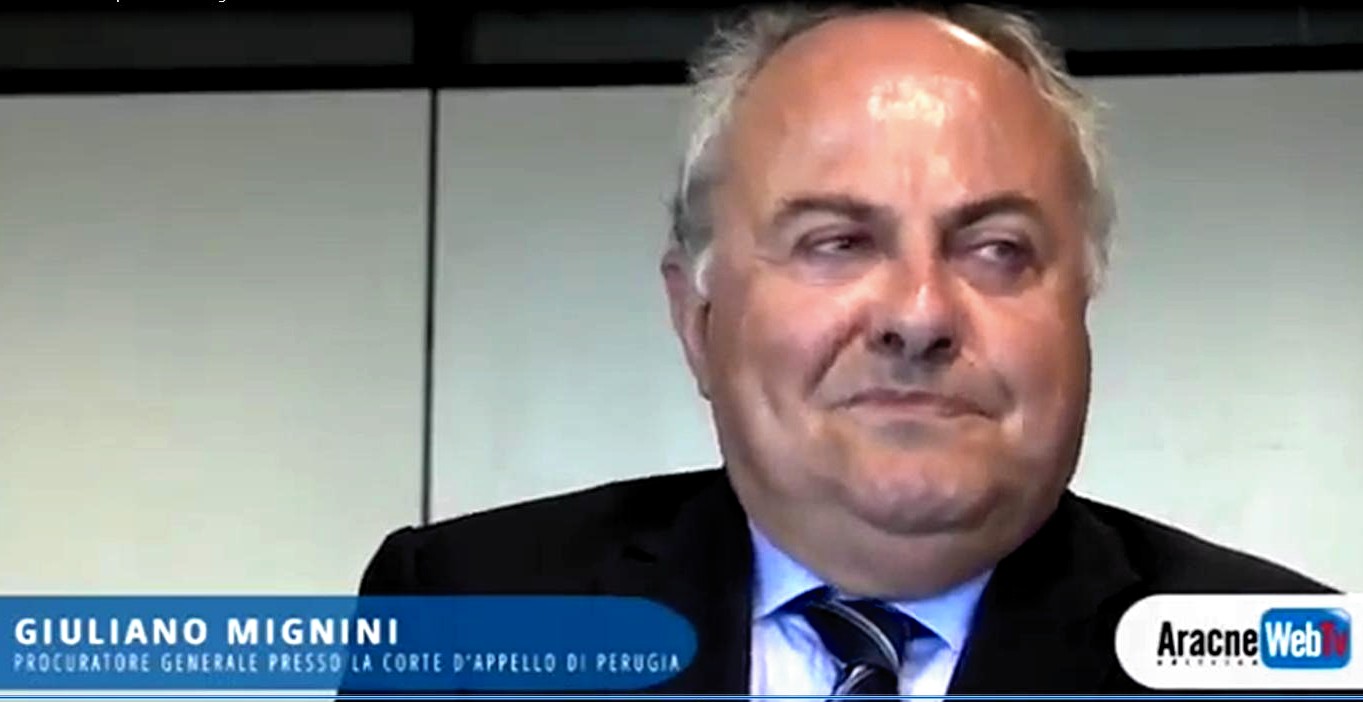
This is my translation from the original In Affaritaliani
Giuliano Mignini, the prosecutor in the Meredith case, speaks: “No bargaining with Sollecito”
Tuesday, 25 September 2012
It has been claimed that Dr Mignini had seemingly bargained with Raffaele Sollecito in order that he would accuse Amanda Knox in exchange for a lighter sentence.
But now the prosecutor in the Meredith case, Giuliano Mignini, has chosen Affaritaliani.it as the forum to break his silence: “No bargaining. It suffices to read the book attentively to understand that I have nothing to do with it. I am disconcerted by this distortion of the facts.”
And further: doubts about Amanda’s guilt? “If I had them [doubts], I would ask for absolution. I have always believed in the responsibility of both of them.”
The pressure while awaiting the sentence was enormous: “I believe that trials should take place in the halls of justice, not outside”. Both Amanda and Sollecito have written books about the murder: “These are choices that each person makes, and for which they are responsible”.
THE INTERVIEW
by Lorenzo Lamperti
In the past few days, Prosecutor Mignini, it has been written that you apparently bargained with the family of Raffaele Sollecito, offering a lighter sentence in return for testimony against Amanda Knox.
“I must say at this point that I am disconcerted [dismayed] by this distortion of the facts. It suffices to read what Sollecito has written in his book in order to understand that I have absolutely nothing to do with it.
Furthermore, Raffaele’s father has denied the existence of any bargaining.
However, I continue to see newspapers which publish these things. Let’s forget about the American newspapers, over which it would be best to draw a pitying veil, however it surprises me that even here in Italy facts are talked about which have never been checked.
Sollecito’s father denied this live on television, and yet there weren’t even any starting points to support something [claims] of this sort.
Thus there was an exploitation is Sollecito’s account?
“That seems clear to me. And yet the event of the Kercher process was preceded by that of the Monster of Florence [the Cassation Court will deliver its verdict on 22 November, editor’s note]. That was what started everything: I never said anything, but I’m fed up, sick and tired at this point. There has been too much superficiality on the Meredith story.”
Raffaele Sollecito speaks of a lawyer who apparently bargained/negotiated with his family…
“These are merely conjectures on conjectures. And yet, I don’t understand how Sollecito’s account can have been interpreted as referring to me. Looking carefully at things, it could almost be said that it is me who is the person offended by a boast.”
Are you considering legal action?
“I have 90 days. I will consider it. Certainly, I must take note of Dr Sollecito’s denial.
What his son wrote, or at least, what the newspapers report, has not been libelous with regard to me. The problem lies in the interpretation of his text that has been made. It would suffice to read [the book] correctly in order to understand that we are talking of simple impressions, not of facts.
The only concrete references are made to a few persons who are not me.”
Therefore you rule out the existence of a secret bargain?
“Indeed! in the most absolute manner possible. What for, why after the conviction and the appeal request for life sentencing, would I seemingly started to negotiate?! What would I negotiate about?
Thus you have never had any doubts about Amanda’s guilt?
These doubts don’t exist. If I had doubts, I would have asked for absolution. I have always believed in the responsibility of both these two.”
The Cassation appeal is also based on Amanda’s conviction for calunnia.
“This is one of the fundamental aspects of the appeal [our appeal against Hellman] which is moreover based on numerous other reasons. The appeal has been made very well. We’ll see what the Cassation decides on 25th March next year.”
The fact remains that a striking situation has been created, in which Rudy Guede has been convicted for contributing to a murder, but according to the courts there are no [other] contributors, or at any rate, Amanda and Raffaele are not contributors…
“Yes, yes. Indeed. Rudy Guede is convicted as having participated. Sollecito and Knox were acquitted. Furthermore, Rudy Guede, as we have seen, was not even convicted of having carried out the simulated break-in…
These are problems that arise with the fast-track trial system, when one part of the case is separated from the other part. This case, on the contrary, is a unitary whole [a single case].
There was very considerable pressure brought to bear on the trial process. Do you believe that it might in any way have had an influence on the sentence?
“I don’t know if it influenced it. I know that the Court had that idea, that conviction, which I don’t share. Certainly the pressure brought to bear was extreme. I believe that trials should take place in the halls of justice, not outside.”
You rashly spoke of an “almost predicted” sentence.
“Those who followed the appeal process can make their own assessments. According to us, the first instance sentence was correct and complete. We’ll see what Cassation decides, but, over and above the process I cannot accept certain insinuations.
I was exclusively made the butt of attacks. I remain dismayed, for example, when reference is still made to comments I denied having made years ago, in which I reportedly linked Meredith’s murder to satanic rites. This is something I never said, but which is still continuously written.”
Is it a case of errors, superficiality, or of something more?
It is no longer possible to talk of errors, because it has been years since I disclaimed those comments. At this point, the thing confounds me.”
Many people, faced with Sollecito’s book and the one by Amanda which will come out shortly, turn up their noses and consider it wrong to profit from a tragedy such as the murder of Meredith. What do you think?
“These are choices that each person makes, and for which they are responsible. I will limit myself to saying that the process is still under way, and we must await Cassation.”
Sollecito’s Book Honor Bound Hits Italy And Already Scathing Reactions And Legal Trouble
Posted by Peter Quennell
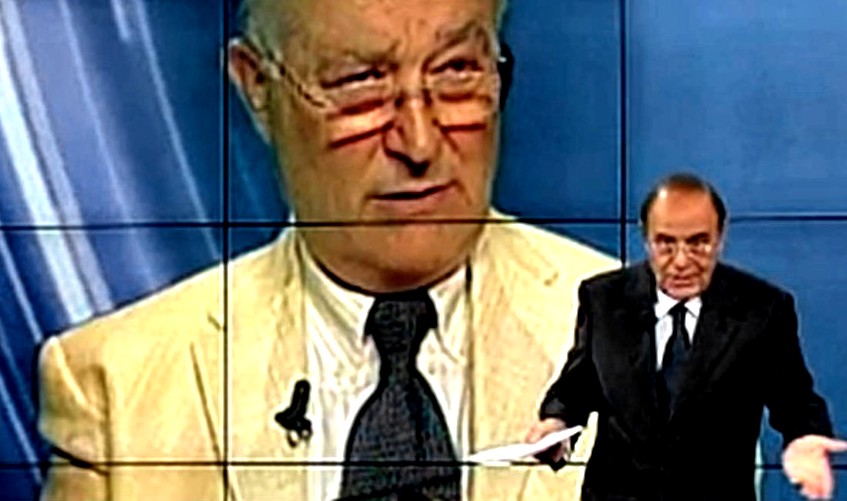
[Above: Sollecito’s father Francesco on Italian national TV being made to admit the book lied]
The Sollecito/Gumbel book is an “own goal”
In Italy the extremely inaccurate and hyper-aggressive book has already set themselves up for two kinds of trouble
The Gumbel and Sollecito book was released in English on 18 September 2012 and within ten days all of Italy knew that the book was a crock.
Sollecito’s own father and own lawyers Bongiorno and Maori have already been forced to admit the book contains serious lies.
Already the prosecution has indicated that they are weighing whether there might be new charges lodged against Sollecito.
Analysis Of 3 Claims Of Criminal Conduct
We focus on three claims by Sollecito and Gumbel of criminal behavior which have already been widely repudiated by the Italian press.
1. A deal was sought by prosecution to frame Knox
Sollecito’s own father Francesco was made to concede by the host and all other guests on the popular Porta a Porta TV show last week that Sollecito lied in claiming that the prosecution had sought a deal under which Sollecito would frame Amanda.
Such a deal would be illegal so Sollecito was falsely accusing prosecutors of a very serious crime. Francesco Sollecito backed down even more in some interviews later. One of Sollecito’s own lawyers, Luca Maori, immediately denied in obvious frustration that the offer of any deal either way ever happened, and Giulia Bongiorno soon publicly agreed. .
2. A long brutal interrogation on 5-6 November 2007
Sollecito has suddenly claimed in the book, nearly five years after he said it happened, in face of vast evidence including his own writings to the contrary, that police interrogated him over 10 hours, and abused and threatened him.
But he was demonstrably not ever interrogated over 10 hours, and he folded fast when they showed him his phone records, which contradicted his earlier alibis, and so he promptly laid the blame on Amanda.
The English translations of the lengthy court transcripts of those many who were present at the central police station on the night all coincide, and damn the version cooked up by Sollecito and Gumbel..
3. Deliberately wrong reasoning in the Galati appeal
All this trouble flows from half a dozen pages of Sollecito’s book made public in Italy! Here now are several more pages not yet known about there (we will have many more) which our poster ZiaK has translated into Italian to help everybody to read. Sollecito ridicules both Dr Galati and his appeal. Let’s see:
- Dr Galati is recognised as one of the most brilliant lawyers in Italy, and he is a former Deputy Chief Prosecutor at the Supreme Court, specially assigned to Perugia because cases involving the central government are handled there when they are too hot to handle in Rome.
- Solllecito is of course a 28-year old student with a cocaine record and a long history of parental supervision who has never held a job in his life. He failed the entrance exam in virtual reality for the University of Verona but still has delusions of a career in computer games.
And surely Gumbel would never have got the job if Bongiorno and Maori had the opportunity to size up how wildly incompetent about the law and the case and and twisted in his mind about Italy he seems to be.
These ill-advised pages below show Sollecito’s and Gumbel’s profound ignorance of Italian jurisprudence, a total incomprehension of the wide scope of the appeal, and their contempt toward the advice from his lawyers.
Passages highlighted are wrong on the hard facts as shown in part 2 below.
1. What The Sollecito/Gumbel book claims
Judge Hellmann’s sentencing report was magnificent: 143 pages of close argument that knocked down every piece of evidence against us and sided with our experts on just about every technical issue. It lambasted both the prosecution and the lower court for relying on conjecture and subjective notions of probability instead of solid evidence. And it launched a particularly harsh attack on Mignini for casting aspersions on the very concept of proof beyond a reasonable doubt.
Mignini had dismissed it in one of his court presentations as a self-defining piece of linguistic trickery. Hellmann pointed out that reasonable doubt was now””belatedly””part of the Italian criminal code. A case built on probability alone, he said, was not sufficient and must necessarily lead to the acquittal of the defendant or defendants.
The prosecution’s rebuttal of the sentencing report, filed a couple of months later, was little short of astonishing.
It accused Hellmann of indulging in circular arguments, the old rhetorical fallacy known to the ancients as petitio principii””essentially, starting with the desired conclusion and working backward. The criticism applied much more accurately to what the prosecution and Judge Massei had done themselves; everything, even the absence of evidence, had been a pretext for them to argue for our guilt. But the author of the prosecution document, Giovanni Galati, chose not to dwell on such ironies. Instead, he attacked Hellmann””I wish I were joking about this””for resorting to deductive reasoning. Making yet more allusions to grand rhetorical principles, Galati said he had a problem with the appeals court taking the available evidence and seeking to make each piece follow on logically from the last. I take it he is not a fan of Sherlock Holmes.
Galati seemed incensed that Hellmann had found the “superwitnesses” unreliable. He argued that Hellmann’s problem with Antonio Curatolo, the heroin addict in Piazza Grimana, was not his failure to be consistent about the details of when and where he had supposedly seen us but rather Hellmann’s own “unwarranted prejudice against the witness’s lifestyle.” Galati even dared to embrace Curatolo’s argument that heroin is not a hallucinogen to insist he must have been telling the truth.
These arguments, to me, made a mockery of civilized discourse. I don’t honestly know how else to characterize them.
From my experience, I also know they are the bread and butter of the Italian legal system, the peculiar language in which arguments and counterarguments are formed every day. Not only do innocents go to prison with shocking regularity, while guilty people, equally often, win reprieve or acquittal; magistrates and judges who make the most howling errors rarely pay for their mistakes.
See Part 3 below for an Italian translation of the above, kindly supplied by main poster ZiaK.
2. Correctly explaining Cassation’s reasoning
Read all the posts here. Also read all the posts linked to here.
Italy’s excellent justice system is in fact exceptionally pro defendant, and prosecutors have to jump through more hoops than any other system in the world. Major errors and framings of innocent parties never make it through to a final guilty verdict.
Correctly understood in light of that system, there was nothing magnificent about the Hellman-Zanetti outcome. The Hellmann court is KNOWN to have been hijacked.
And these posts by Cardiol and James Raper show the report was written by two biased and wrongly qualified judges way out of their depth on both the evidence and the law.
Here is main poster Machiavelli’s explanation of what Sollecito.doesn’t get. The required logic Sollecito is ridiculing is intrinsic to Italian jursprudence (and US and UK jurisprudence) and is REQUIRED by the Supreme Court.
In plain English, Dr Galati is saying that Hellmann-Zanetti ignored that requirement.
Instead, they illegally went cherrypicking, with an extreme pro-defendant bias up-front. Bold text here is to emphasize that.
2. The failure to apply the inferential-inductive method to assess circumstantial evidence. This is a key point based on jurisprudence and is in fact a devastating general argument against Hellmann-Zanetti:
The appeal to Cassation’s jurisprudence on the circumstantial case originates from the fact that the Assize Appeal Court did not deploy a unified appreciation of the circumstantial evidence and did not examine the various circumstantial items in a global and unified way.
With its judgment it has, instead, fragmented the circumstantial evidence; it has weighed each item in isolation with an erroneous logico-judicial method of proceeding, with the aim of criticizing the individual qualitative status of each of them ..
Dr Galati accuses the appeal court of focusing on the quality of some pieces of circumstantial evidence, instead of their correlation to each other as the Supreme Court always requires. .The appeal judges, in actual fact, deny that the probative reasoning and the decisive and cognitive proceeding of the court is to be found in the circumstantial evidence paradigm of the hypothetico-probabilistic kind, in which the maxims of experience, statistical probability and logical probability have a significant weight.
The court must reach a decision by means of the “inductive-inferential” method: it proceeds, by inference, from individual and certain items of data, through a series of progressive causalities, to further and fuller information, so arriving at a unification of them in the context of [13] the reconstructed hypothesis of the fact.
This means that the data, informed and justified by the conclusions, are not contained in their entirety in the premises of the reasoning, as would have happened if the reasoning were of the deductive type “¦ (..) A single element, therefore, concerning a segment of the facts, has a meaning that is not necessarily unambiguous.
Dr Galati cites and explains further:
The Perugia Court of Appeal has opted, instead, precisely for the parceled-out evaluation of individual probative elements, as if each [14] one of them must have an absolutely unambiguous meaning, and as if the reasoning to be followed were of the deductive type.
This error emerges from the text of the judgment itself, but the gravity of the error committed by the Court in its decision derives from the fact that even the individual elements had been acquired by the cognitive-decisioning process in a totally partial manner, isolating the sole aspect that allowed the recognizing of doubts and uncertainties in the element itself..
So Galati-Costagliola concludes ““ and this by now is obvious ““ that the Hellmann-Zanetti court followed a “deductive only” paradigm on pieces in isolation, instead of the “inferential-inductive” paradigm prescribed by Supreme Court requirements (1995).
Moreover, Hellmann-Zanetti applied a deductive paradigm of assessment only to some cherry picked aspects of the single isolated pieces of evidence, overlooking other qualities of the single piece (an example ““ my own ““ is the possible “contamination” of the bra clasp found on the floor in the murder room.) Ordering an assessment of the quality of any element as if it was a proof in isolation from the rest of the evidence is itself unlawful.
But Hellmann”“Zanetti also picked out of the evidence one aspect alone, for example it points to the theoretical possibility of contamination by touching from gloves, but does not consider the negative check results from the possible contamination sources. The interpretation of X-DNA from the bra-clasp by Vecchiotti in the conclusion is worded as if to ignore the results on the Y-haplotype, and so on.
So even single aspects/qualities of isolated items are further isolated from other aspects by Hellmann-Zanetti, and are assessed without looking for a relationship to the context. This is a core violation of the basics of jurisprudence in cases based on circumstantial evidence.
3. Italian Version of the passage on the Cassation appeal from Sollecito’s book
This translation is kindly provided by main poster ZiaK.
Il rapporto di motivazioni del giudice Hellmann fu magnifico: 143 pagine di ragionamenti serrati che demolirono ogni singolo pezzo di prova contro di noi, e che con riferimento a quasi ogni questione tecnica presero le parti dei nostri esperti. Il rapporto strigliò sia la pubblica accusa, sia la corte di prima istanza per il loro affidamento ai congetture e ai nozioni soggettivi di probabilità invece di dipendere su prove solide. Perdipiù, il rapporto sferrò un attaco particolarmente severo su Mignini per aver denigrato il concetto stesso di prova oltre ogni ragionevole dubbio. Mignini aveva già scartato questo concetto come un inganno linguistico auto-determinante nel corso di uno delle suoi presentazioni alla corte. Hellmann fece notare che il dubbio ragionevole fa ormai - tardivamente - parte del codice penale italiano. Una causa stabilita unicament su probabilità , disse Hellmann, non é sufficiente e deve necessariamente condurre all’assoluzione del imputato o degli imputati.
La confutazione del rapporto della parte dell’accusa, presentato in appello un paio di mese dopo, fu quasi una cosa sbalorditiva.
Accusò Hellmann di abbandonarsi a argomentazioni viziosi, in quella vecchia falsità retorica conosciuta dagli antichi come petitio principii - cioè,sostanzialmente, partire dalla conclusione desiderata per poi andare a ritroso. Questa critica potrebbe essere applicata con molto più precisione a ciò che fecero l’accusa e il giudice Massei stessi: tutto - compresa anche la mancanza di prove - gli é servito di pretesto per dare appiglio agli loro argumenti sostenendo la nostra colpevolezza. Ma l’autore di quel rapporto della pubblica accusa, Giovanni Galati, scelse di non soffermarsi su queste ironie. Al contrario, preferii attacare Hellmann - io desideri davvero fossi solo scherzando su questo punto - per il suo aver ricorso al ragionamento deduttivo. Perdipiù, facendo ancora altre allusioni a grandi principi retorici, Galati si dichiarò insoddisfatto del fatto che la Corte d’appello avesse preso prove disponibili e avesse cercato di far seguire in modo logico un pezzo dopo l’altro. Devo supporre che Galati non sia un tifoso di Sherlock Holmes.
Galati sembrò furibondo che Hellmann avesse trovato inaffidabili gli “supertestimoni”. Sostenne che la difficoltà che Hellman terrò a proposito di Antonio Curatolo, il tossicomane della Piazza Grimana, non fu la sua incapacità di ricordarsi con coerenza i dettagli su quando e dove fossimo presumibilmente visti, ma piuttosto il “pregiudizio ingiustificato contro il modo di vivere del testimone” mantenuto del stesso Hellmann. Galati osò persino cogliere l’argomento di Curatolo, secondo il quale l’eroina non é un allucinogeno, per sostenere che Curatolo avesse dovuto dire la verità .
Tali argomentazioni, al mio parere, svuotino il discorso progredìto di tutte le sue valori. In onestà , non saprei descriverli in modo diverso. Nella mia esperienza, so anche che sono il fondamento del sistema giuridico italiano, e della la lingua particolare nella quale gli argumenti e controargumentazioni sono formulati ogni giorno. Non solo gli innocenti vengono incarcerati con preoccupante frequenza, mentre le persone colpevoli con altrettanto frequenza ottengono sospensione o assoluzione, ma anche i magistrati ed i giudici che fanno gli più strepitosi errori pagano raramente per i loro sbagli.
.
[Below: Sollecito’s lead lawyer Bongiorno. Still in shock? She has made no statement yet on his book]
